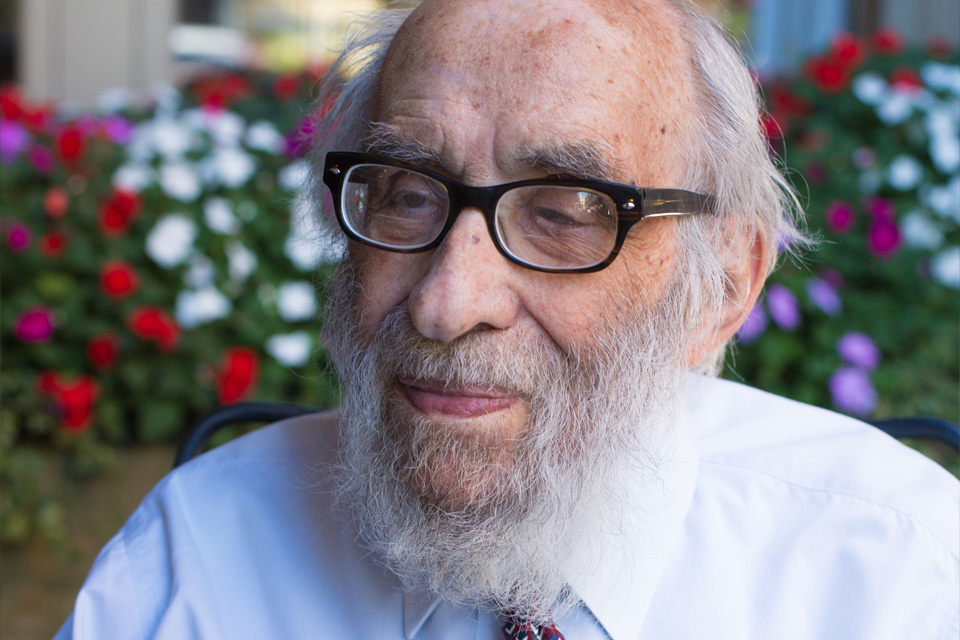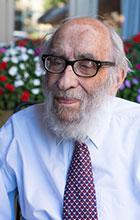When friends, colleagues and former students talk about Max Ticktin, the recently retired professor of Hebrew and the cornerstone of Judaic Studies at GW for three decades, they tend to use terms like “legendary,” “treasure” and “inspiration.”
But there’s one word that everyone agrees best suits the 93-year-old rabbi—and it's the way people address him whether they simply sat in on his Hebrew language class or, like many of his students, they became enduring and cherished friends.
“Max,” said Ticktin. “That’s what everyone calls me. Just Max.”
For a renowned figure with such an accomplished reputation—a student in Jerusalem during the early days of Israeli independence; an influential leader in the Hillel movement; a beloved academic in fields from language and literature to American and Jewish history—Ticktin might be best known for his self-effacing manner and his warm personality. “He is everyone’s beloved grandfather,” said longtime community and national philanthropist Susie Gelman, a friend and student of Ticktin’s. “To know Max is to love Max.”
And now his name has taken on a new significance. With the Max Ticktin Professorship of Israel Studies, a newly endowed professorship established by a grant from Susie and Michael Gelman’s Morningstar Foundation, Ticktin will be the face of an emerging Israel Studies component of the Judaic Studies Program. The professorship will promote the academic field of Israel Studies by developing and engaging a strong community of scholars of Israel. The position will also support the training and mentorship of students to help foster a broad understanding of the history, politics, society and culture of modern Israel.
“It is no secret that Judaic Studies is a vibrant field that offers much to our understanding of the modern and pre-modern worlds,” said Ben Vinson, dean of the Columbian College of the Arts and Sciences. “The addition of a dedicated professor who will advance the discourse and knowledge of the field will help us reach our goal of becoming one of the premier academic destinations for the study of Israel.”
The professorship honor, a recognition of Ticktin’s legacy as a beloved and influential teacher, evolved from his relationship with Susie Gelman, who began studying Hebrew literature with him as a non-degree student in the early 2000s and quickly became a close friend.
“I took his class to brush up on my Hebrew, and along the way I learned an incredible amount and also witnessed the special interaction that Max has with his students,” she said. “He makes every student feel valued, appreciated and respected.”
|
Rabbi Max Ticktin (Photo: Judy Licht) |
Ticktin grew up in an Orthodox home in Philadelphia, the son of Polish immigrants. His grandfather, a rabbi who refused to accept payment for his lessons, instilled in him the value of education. As a young man in the 1940s, Ticktin traveled to Jerusalem to study at the Hebrew University during the height of Israel’s struggle for independence. While he joined the Haganah defense force, he joked about his ineptitude as a soldier. Instead, he was drawn to studying the Torah, speaking Hebrew and, like his grandfather, preparing for a lifetime of teaching.
A towering figure in the history of Hillel, the largest Jewish student organization in the world, Ticktin’s academic career began in 1948 as a Hillel instructor at the University of Wisconsin. As the organization’s assistant director for more than a decade, he recruited and trained a generation of Hillel directors while pioneering social justice causes like women's rights. “Not only does he have an encyclopedic knowledge—one can only sit in awe of all he knows and is able to share— but his life overlaps with so much of Jewish history,” Gelman said. “In many ways, he is a walking embodiment of the history of Jewish people.”
Ticktin joined the GW faculty in 1979, where he taught courses in Hebrew language and contemporary Israeli literature until his retirement in 2014. He gained a reputation as a teacher who connected easily with young people and a consummate storyteller who captivated audiences from the greenest undergraduate to the most-studied academic. A Ticktin lesson on Hebrew grammar might veer into a brilliant reflection on how Shakespeare’s sonnets compare to the King James Bible. Or a visit to a colleague’s office to offer “Good Shabbos” wishes might blossom into a relaxed afternoon spinning tales of his parents’ immigrant journey in the 1920s.
“He is a treasure of a human being,” said Daniel Schwartz, associate professor of history and director of GW’s Judaic Studies Program. “His most central legacy is as a teacher—Max has taught thousands of people.”
Ticktin said he encouraged his students to take chances and approach unfamiliar subjects with a spirit of discovery—whether he was teaching language, literature or history. “The fun comes when the students are open-minded, when they are willing to try anything and say anything,” he recalled. “Sometimes they said brilliant things, sometimes outrageous things. But they were always sharpening their skills—language skills, analytic skills—and doing things they never expected.”
With no dedicated Israel Studies program currently within GW’s Judaic Studies, the Ticktin Professorship is the first step in “filling a gap,” Schwartz said. Currently, parts of the curriculum are taught by professors from disciplines like history, religion and classical languages. “The vision is to bring these courses into one house as an essential component of a strong Jewish Studies program,” Schwartz said. Or, as Ticktin echoed, “A historian will see things differently than a cultural anthropologist. But in the new Israel Studies, I would like to see what happens when they talk to each other.”
Ticktin is currently directing small adult studies classes, although he misses striking up informal conversations with colleagues from across disciplines. “I liked to chat with people in the English Department, the Art History Department, the History Department, anyone who would stop to talk,” he said. “I’d always come away admiring their knowledge, intelligence and openness.” And he recalls the excitement he felt guiding young people through new discoveries. “The delight—that’s the exact word: delight!— I had in watching students grapple with new things, new ideas, new concepts,” he recalled. “There’s nothing else quite like that.”



